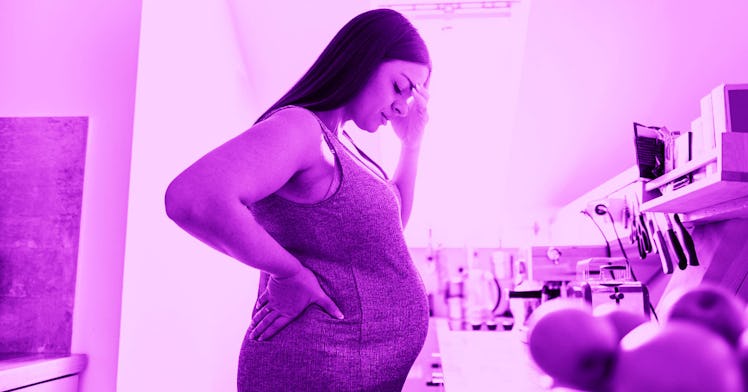How to Have a Boy? Be Less Stressed During Pregnancy, Says New Study
Stressed women are less likely to give birth to sons, according to new research. Are we about to see an influx of baby girls?

Mothers who experience more psychological stress during pregnancy are less likely to give birth to boys than girls, new research out of Columbia University reveals. This is not because it actually changes their biological sex, but because there is something about the stress that makes it harder for male fetuses to survive at all. The findings help to explain why fewer boys are born following tragedies like 9/11 and underscore the importance of physical and emotional support for pregnant people.
“Some epidemiological studies have shown that stress also affects the population-norm male-female sex ratio,” study co-author Dr. Catherine Monk, professor of medical psychology and director of women’s mental health in OB/GYN at Columbia University Irving Medical Center, explains.
Typically there are about 105 males are born for every 100 female births, according to the World Health Organization. This number has remained relatively consistent, except in the cases of acute stress. One 2012 study that women who were pregnant during severe earthquakes in Chile experienced fewer male births. Other evidence indicates that stress levels prior to conception could also decrease the number of boys being born. Scientists believe this is a result of male fetuses responding differently to stress than female ones in the womb, and potentially being more vulnerable as a result.
For the current study, Monk and her team to replicate past findings and see if maternal stress was consistently correlated with an altered sex ratio, and to distinguish between the effects of physical and psychological stress as well.
“We wanted to identify which type of stress ‘matters’ for these outcomes, as stress can be experienced as a psychological feeling of being overwhelmed, burdened, and also ‘get under the skin’ and show up in physical signs of wear and tear on the body.”
To do this, researchers analyzed 27 indicators of psychosocial, physical, and lifestyle stress that were recorded from surveys, journals of 187 otherwise healthy pregnant women between the ages of 18 and 45. Subjects also participated in regular physical assessments at 12 to 22 weeks, 23 to 28 weeks, and 34 to 36 weeks of pregnancy, to measure blood pressure, cortisol levels, psychological symptoms such as depression and anxiety, and other indicators of stress and overall risk.
Of these, 17.1 percent of women had higher levels of depression, anxiety, and perceived stress, and were considered more psychologically stressed overall, whereas and 16 percent of women had higher blood pressure and calorie intake, which were categorized as more physically stressed. These women also had notably fewer male births compared to other women in the study. The sex ratio of babies born to mentally stressed mothers was 2 boys to every 3 girls, and the for physically stressed mothers it was 4 boys to every 9 girls born.
When mothers were not considered physically or mentally stressed, about 66.8 percent of the women studied, the number of boys born to girls reflected the well-established 105 to 100 ratio — 23 boys for every 18 girls born. Although Monk expected mental and physical stress to shift sex ratios, she was surprised by the extent it did, particularly for mothers who were physically stressed. “There was such a clear cut group of women who were physically stressed,” Monk said.
It’s tempting to interpret this as stress playing some sort of a role determining sex organs, and some headlines about the current study suggest that. However, Monk and her colleagues believe what’s happening is bleaker. Stressed pregnant women are likely at an increased risk of miscarriages with sons compared to daughters. While every woman in this research knew they were pregnant initially, the study authors suspect that many stressed-out women outside of the study may miscarry with boys without ever realizing they are pregnant.
“We interpret our results as indicating that the stressed women had had prior losses that were male so that for this pregnancy, the surviving baby was female,” Monk noted. “This interpretation is based on past work in evolutionary biology, which indicates that males are more vulnerable to adverse in utero environments.”
More research needs to be done to replicate these findings and figure out what exactly makes male fetuses more vulnerable. In the meantime, the takeaway for expecting parents is far from “don’t stress.” Pregnancy should be stressful. People are preparing to raise a baby and that is a big, panic-inducing deal. The key is to keep stress at manageable levels and know when to ask for help, or in the case of their partners, friends, and family members, know how to offer it.
Social support — defined in the study as a sense of belonging to a group, having people to talk to, and help with errands — made a significant difference between women who experienced healthy and dangerous levels of stress. And dads-to-be can provide that long before they know if they’re having a son, daughter, or if they’re even officially expecting at all, just in case.
“Social support may be a key target for helping stressed pregnant women,” Monk concluded.
“Much of this support ideally could come from a partner. They are a key person in the pregnant woman’s life.”
This article was originally published on